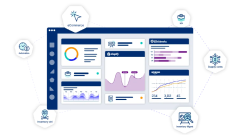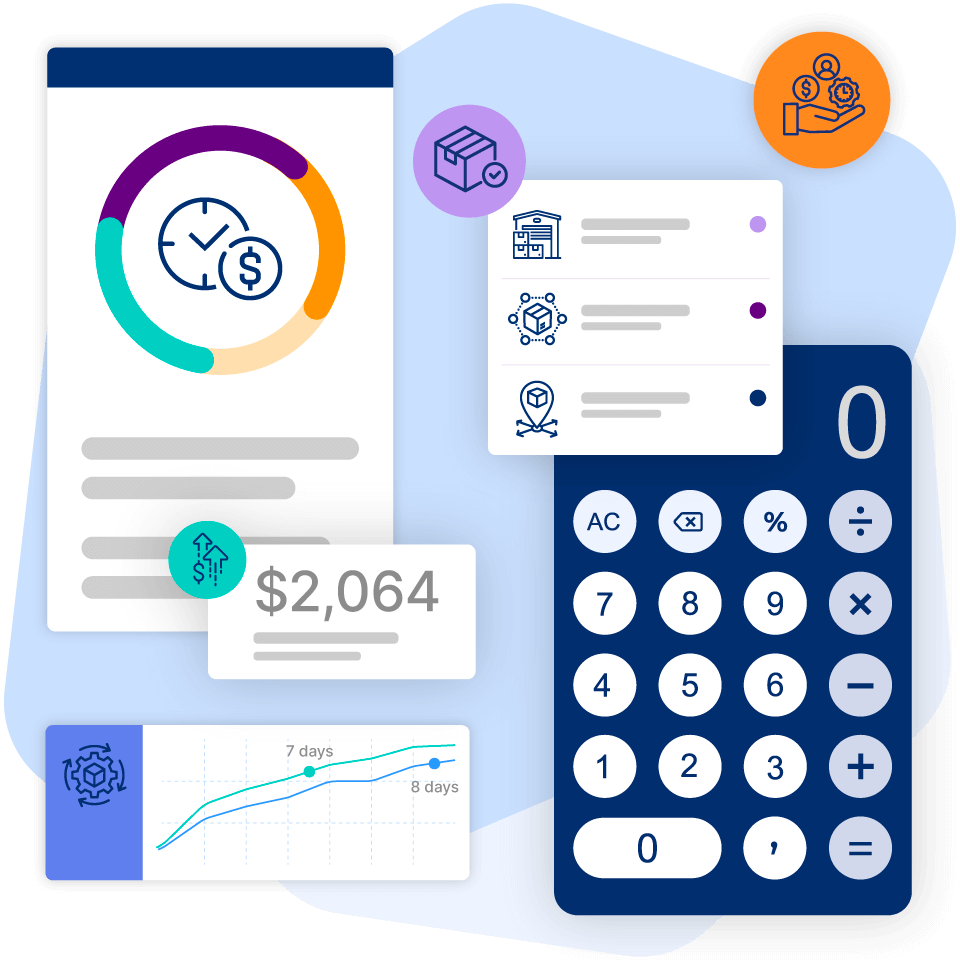MES vs ERP: Which Drives Your Manufacturing Better?

MES and ERP are two of the most common terms in the world of manufacturing software.
If you're involved in this industry, you’ve probably encountered them in conversations about optimizing factory operations, streamlining production, or enhancing overall business efficiency. But what exactly do these systems do, and why are they essential in manufacturing?
In this MES vs ERP comparison guide, we'll explain the primary differences between the two systems, where their functions overlap, and when it makes sense to use one over the other. We’ll also show you how investing in both systems and integrating them can unlock powerful benefits like enhanced real-time visibility, greater data accuracy, and smarter decision-making across your entire operation.
MES vs ERP: What’s the Core Difference?

Manufacturing Execution Systems (MES) is a software solution that manages and monitors production operations on the shop floor. It provides real-time visibility into how a manufacturing process can be improved, capturing detailed data and providing actionable insights as work happens.
Its main functions include:
- Production tracking: Monitoring progress and status of manufacturing orders as they move through each stage.
- Scheduling: Managing machine and labor allocation to optimize workflow.
- Quality control: Recording defects and ensuring products meet specifications as they are being made.
- Data collection: Collecting live data from machines, operators, and workflows to provide instant insight into performance and identify areas for improvement.
In short, MES acts as the operational control centre of the shop floor, making sure production runs smoothly, efficiently, and according to plan.
By contrast, an Enterprise Resource Planning (ERP) system is a centralized software platform that helps organizations manage and integrate core business processes across departments. While MES focuses on execution at the factory floor level, ERP operates at a broader, organizational level, helping decision makers plan, coordinate, and control resources across departments like finance, procurement, HR, and production planning to keep the entire business aligned and running efficiently.
While systems can vary by vendor and industry, a standard ERP system typically includes modules for managing the following functions.
- Finance and accounting: Managing budgets, costs, and financial reporting.
- Inventory management: Tracking raw materials, work-in-progress, and finished goods.
- Procurement: Monitoring and controlling sourcing and purchasing, and maintaining relationships with suppliers to ensure the timely acquisition of raw materials and services.
- Human resources: Managing workforce data, payroll, and staffing.
- Production planning: Creating high-level production schedules and forecasts.
- Compliance and risk management: Ensuring regulatory compliance, enforcing internal policies, and mitigating risks.
- Supply chain management: Coordinating logistics, transportation, demand forecasting, and supplier collaboration to ensure the timely delivery of materials and products.
- Sales and order management: Processing sales orders, managing pricing, and tracking deliveries.
- Customer relationship management (CRM): Managing customer data, tracking sales pipelines, running marketing campaigns, and providing customer support.
These best ERP systems are modular and customizable, allowing organizations to tailor the system to meet specific operational and strategic needs.
MES vs ERP: Where Do They Overlap?
Although MES and ERP have distinct roles, there are significant areas where their functions intersect:
- Production planning and scheduling: Both systems contribute to production planning and scheduling, but at different levels. ERP creates long-term production plans based on demand forecasts and resource availability. MES translates these plans into actionable tasks on the shop floor. The MES can adjust schedules dynamically to address issues like machine downtime, labor shortages, or unexpected bottlenecks.
- Inventory management: ERP tracks inventory across the entire business, including raw materials, work-in-progress, and finished goods. MES focuses on manufacturing operations and real-time material usage during production, making sure the right components are in the right place and time on the shop floor to keep operations flowing smoothly.
- Data collection and reporting: ERP aggregates data for company-wide reporting, financial analysis, and strategic planning. MES collects detailed, real-time data about production processes, machine status, and quality metrics. Some of this data overlaps, providing different layers of visibility into manufacturing performance.
- Quality management: Both systems contribute to quality control and management. ERP may handle compliance documentation and supplier quality management. At the same time, MES enforces quality standards on the shop floor, capturing defects in real time and helping ensure products meet specifications during production.
Which Is Right for Your Business? MES vs ERP By Use Case
Choosing between MES and ERP depends mainly on your company’s size, growth stage, and manufacturing complexity.
Small Manufacturers and Startups
If you're a small manufacturer or just starting, your main goal is usually to get the basics right: effectively keeping track of inventory, processing orders, and managing finances. At this scale, production processes are less complex, and the detailed, real-time shop floor control offered by an MES may not be an immediate necessity.
A solid ERP system designed for small businesses (or even good accounting software with basic inventory and production management features) is often enough to handle your core business needs. However, as you grow and your operations become more complex, adding MES capabilities will likely become essential to improve visibility into your shop floor and boost production efficiency.
Mid-Size Businesses Scaling Production
For manufacturers in a growth phase, where production is becoming more complex and volumes are increasing, an MES becomes incredibly valuable. As we saw, it provides real-time visibility into shop floor operations and can help optimize production line efficiency and improve product quality. Meanwhile, an ERP would continue to support broader organizational functions such as finance, procurement, and sales, keeping the entire business aligned.
Enterprise-Level Manufacturers
Large, established manufacturers often operate in complex environments with multiple facilities, extensive supply chains, and high-volume production. For these organizations, having both MES and ERP systems working in harmony is essential. ERP manages company-wide resource planning, financials, and overall supply chain management, while MES ensures consistent, efficient production across all factories and product lines.
Hybrid Approach: Integrating MES with ERP
For most manufacturers, the ideal solution is not choosing one over the other but investing in both systems. This allows you to leverage the specialized strengths of MES for detailed production management and ERP for comprehensive enterprise-wide resource planning.
Adopting both provides the foundation for more informed decisions, better resource management, and improved production outcomes.
How Do MES and ERP Work Together?
MES and ERP systems are powerful on their own, but their most significant potential is unlocked when they work together. ERP integrates with MES to establish a continuous, bi-directional flow of information, leading to significant advantages that boost manufacturing efficiency and overall business performance.
These advantages include:
Enhanced End-to-End Visibility
Integrating MES and ERP gives you unparalleled end-to-end visibility and control. ERP systems provide a high-level overview of business activities like sales, inventory, and finances. When connected with an MES, which offers real-time data on production, businesses gain a complete, transparent view of their operations. This comprehensive visibility empowers you as a manufacturer to identify production bottlenecks faster, accurately track performance against targets, and make proactive, data-driven decisions that keep your operations running smoothly and efficiently.
Improved Data Accuracy and Consistency
When MES and ERP operate independently, data often lives in separate silos and requires manual transfer. This manual process is highly prone to errors, inconsistencies, and significant delays. As one study highlights, employees can waste up to 12 hours weekly chasing data, while poor data quality due to issues such as fragmentation costs companies an average of $12.9 million annually.
Integrated systems automate data sharing, ensuring that business planning and shop floor execution operate with the most current and consistent information.
Empowered Real-Time Decision-Making
A unified ERP-MES environment empowers faster, more informed decision-making. When ERP and MES are connected, strategic plans created in ERP can be executed immediately through MES, while live production data from MES feeds back into ERP. This continuous loop empowers faster, smarter decision-making at every level.
For example, if an unexpected machine breakdown occurs on the production floor (reported by MES), the ERP system immediately knows that production targets will be affected. It can then automatically adjust material orders, notify sales of potential delays, or even reroute production to another line. Conversely, if a sudden surge in customer orders comes into the ERP, the MES can instantly prioritize those orders on the shop floor, allocating resources to meet the new demand efficiently. This agility and responsiveness is crucial for maintaining competitiveness and meeting market demands effectively.
MES vs ERP FAQs
Can MES Replace ERP?
Not entirely. MES and ERP are built for different purposes, and one doesn’t necessarily replace the other. MES manages and controls production operations on the shop floor, while ERP handles and integrates broader business functions such as finance, procurement, inventory, and HR. Most manufacturers benefit from using both, often in an integrated setup.
Do I need both MES and ERP?
That depends on your business needs and operational complexity. If you’re a small manufacturer with straightforward production and limited resources, you might start with an ERP designed for small businesses that offers basic production and inventory management capabilities. But as your operations grow and become more complex, an MES becomes essential for optimizing production operations.
What’s the ROI of integrating MES and ERP?
Integrating MES and ERP delivers strong ROI by streamlining operations, reducing manual work, and improving data accuracy across the organization.
What are the disadvantages of using just an MES or ERP by itself?
Using just one system can leave gaps. Relying solely on ERP may limit your ability to respond quickly to manufacturing challenges on the shop floor due to a lack of real-time visibility. Conversely, using only an MES can make it challenging to coordinate essential business functions like finance, procurement, and human resources.
ERP vs MES: Get the Best of Both Worlds
MES and ERP serve distinct but equally essential and complementary functions in manufacturing. MES manages and controls production operations on the shop floor while ERP manages and integrates numerous business functions, including finance, procurement, inventory, and more.
While each system brings unique benefits, organizations gain the most value by investing in both and then integrating them. This integration breaks down data silos, synchronizes production with business planning, and enables faster, more informed decision-making. Together, MES and ERP create a unified ecosystem where organizational goals and operational execution align seamlessly.
For manufacturers seeking a unified solution that bridges these worlds, Cin7 presents a compelling option. Cin7 inventory management software combines the broad functionalities of an ERP system with essential manufacturing execution capabilities. With Cin7, you get an ERP Lite solution, designed for SMBs, that manages inventory, orders, production workflows, and business resources from one intuitive and integrated interface. With Cin7 you also have the option of adding a built-in MES with Cin7’s advanced manufacturing module.
Book a free demo of Cin7 today to learn more.
Sources
Airtable and Forrester Consulting. The crisis of fractured organizations. https://www.airtable.com/lp/resources/reports/crisis-of-the-fractured-organization
Gartner. How to Improve Your Data Quality. https://www.gartner.com/smarterwithgartner/how-to-improve-your-data-quality
More from the blog
View All Posts
An overview of the 4 stages of business growth and why it matters
Read More
Cost of goods manufactured explained: a guide for product businesses
Read More




